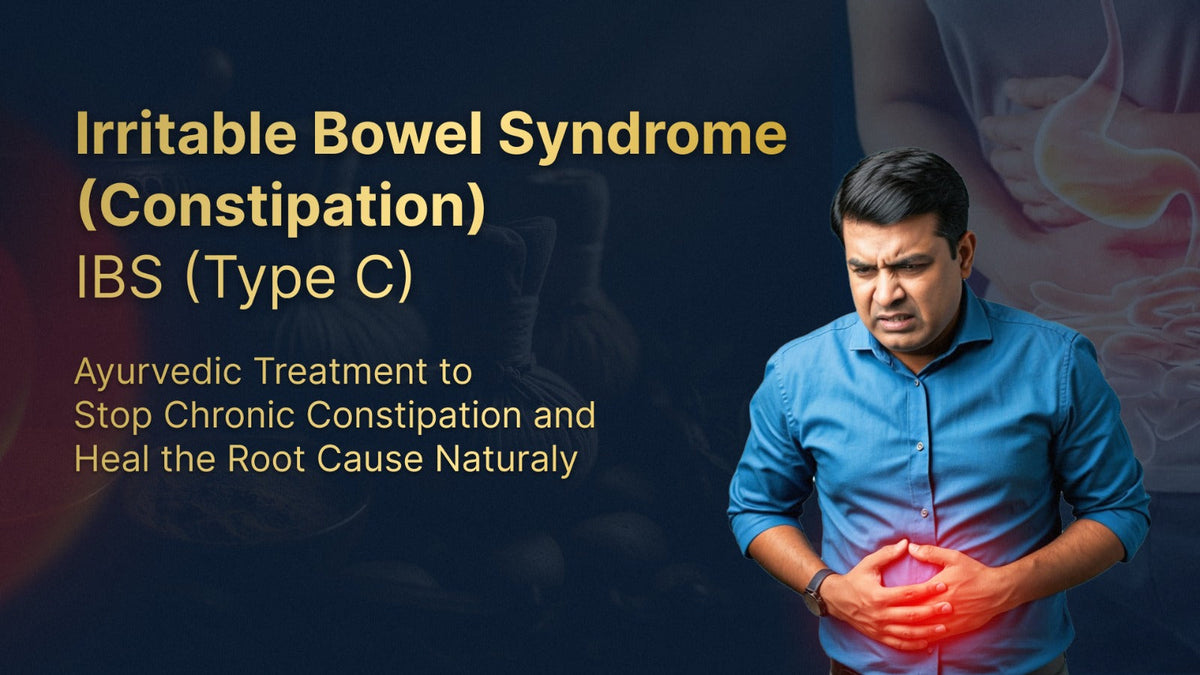
IBS (Type C) Ayurvedic Treatment | Stop Chronic Constipation & Heal the Root Cause Naturally
Why You’re Here – A Story Every Chronic Irritable Bowel Syndrome (Constipation) or IBS(C) Patient Knows
Living with IBS (Constipation) isn’t just about being uncomfortable—it’s about a daily battle with uncertainty, sluggish digestion, bloating, irritability, and an ever-present fear of the next flare-up. If you're here, we can understand that you have been battling for a long time and are not able to get relief:
-
You began with dietary changes, fibre supplements, or home remedies.
-
Used over-the-counter stool softeners, laxatives, and even prescription drugs.
-
You might’ve even dabbled in Google-recommended probiotics, influencer videos, or gut-detox teas and tried everything without even knowing the root cause of your condition.
-
Yet today, constipation, bloating, and incomplete evacuation still rule your life.
You’re now searching for a root-cause-based, lasting solution without any side effects. And Ayurveda may be the very path your body has been asking for.
Present-Day Aggravated Signs & Symptoms of IBS-C
Without a root-focused solution, IBS-C can evolve into a severely distressing condition. You may find yourself experiencing:
-
Infrequent or strained bowel movements (less than 3/week)
-
Bloating and flatulence even after light meals
-
Sticky or mucus-laden stools
-
Lower abdominal heaviness and discomfort
-
Anxiety, disturbed sleep, or emotional exhaustion
Shloka Reference:
कण्ठास्यशोषः क्षुत्तृष्णा तिमिरं कर्णयोः स्वनः |पार्श्वोरुवङ्क्षणग्रीवारुजोऽभीक्ष्णं विसूचिका ||
हृत्पीडा कार्श्यदौर्बल्यं वैरस्यं परिकर्तिका |गृद्धिः सर्वरसानां च मनसः सदनं तथा ||
— ( Charka Samhita, C.S. Ch.15, Shloka 61 & 62 )
Translation: Improperly digested food leads to fermentation, resulting in sour belching; dry mouth and skin; increased thirst and hunger; blurred vision; tinnitus; continuous pain in flanks, thighs, pelvis, and neck; symptoms like vishuchika (vomiting with diarrhoea); chest discomfort; emaciation; weakness; aversion to food; sharp pains; cravings for sweet, sour, and salty tastes; mental fatigue; and abdominal distention during or after digestion. Interestingly, the patient feels temporary relief right after eating.1

Understanding the Root Cause of IBS-C in Ayurveda
Ayurveda identifies IBS-C as Grahani Roga caused by Mandagni (weakened digestion), Vata-Kapha imbalance, and accumulation of Ama (toxic sludge in the intestines).
In-Depth Root Causes:
-
Mandagni (Low Digestive Fire): When Agni is weak, digestion is impaired and food remains undigested. This causes Ama (toxins) to accumulate and clog intestinal pathways.
-
Vata-Kapha Dosha Imbalance: Vata leads to dryness and erratic peristalsis (non-rhythmic movement of intestines). Kapha increases heaviness and stickiness and slows down intestinal movement further. Slowly or with every passing day when you are not addressing the root cause, and this imbalance makes your condition worse.
-
Ama Formation: The sticky residue of undigested food builds up and interferes with gut absorption and motility. This leads to a lot of health disorders, not just constipation. To check if your digestive system is working fine or not, or if Ama is being formed or not, you can see this, as this causes sticky stools or stools with mucus.
-
Manasik Karana (Mental Causes): Prolonged stress disturbs Apana Vayu and leads to a 'gut freeze'—where emotions block physical elimination. Many patients of IBS (Type C) can relate with this because, due to stress, they unknowingly suppress natural urges or engage in binge eating or even not sleep timely, and all such causes lead to an imbalance of Agni (fire element); eventually one gets trapped in the vicious cycle of IBS.
-
Diet-Lifestyle Mismatch: Cold foods, wrong food combinations, erratic eating, frequent snacking, lack of fibre, too much alcohol, non-vegetarian food, smoking, and late-night routines trigger this imbalance. Inadequate sleep makes the condition worse, and recovery becomes more difficult.
Shloka Reference:
कटुतिक्तकषायातिरूक्षशीतलभोजनैः | प्रमितानशनात्यध्ववेगनिग्रहमैथुनैः | करोति कुपितो मन्दमग्निं सञ्छाद्य मारुतः ||
— ( Charka Samhita, CS, Ch.15, Shloka 59 )
Translation: Excessive intake of predominantly pungent foods (katu), bitter (tikta), or astringent (kashaya), as well as those that are dry, light, emaciating, or possess absorbent properties, along with consumption of cold, refrigerated, or frozen items, insufficient food intake, suppression of natural urges, and overindulgence in sexual activity — all these factors contribute to the aggravation of Vata dosha. This aggravated Vata, in turn, hampers the digestive fire (Agni), leading to its suppression.²

Why Ayurvedic Treatment is Essential for IBS-C
Conventional approaches, or the modern allopathic system, aim at symptom control—randomly using laxatives, fibre, or antispasmodics like some SOS drugs without figuring out the root cause of your issues. As these interventions do not address the root imbalance of Agni and doshas, the condition of the sufferer deteriorates day by day, and only a few of them reach genuine Ayurveda experts or hospitals for a natural solution. Irritable Bowel Syndrome needs timely Ayurveda intervention, as it is the best natural way to overcome this disease.
Ayurvedic Treatment Offers:
-
Restoration of Agni: The process of Deepan-Pachan Chikitisa boosts your inner digestive fire to naturally regulate metabolism.
-
Rejuvenation of Gut Tissue: Ayurvedic herbs work like ‘rasayanas’ (tonics), which help a lot to repair mucosal lining and tone colon function.
-
Stress Relief at the Root Level: Vata-balancing herbs and Vata-calming panchakarma therapies are the best combination for mind-body healing. At initial stages one can even balance Vata Dosha imbalance through herbs, and if the condition worsens, then a combination of both herbs and Panchakarma works quickly, and effective results can be felt immediately.
-
No Dependency or Side Effects: Herbs, oils, and the Ayurvedic diet—these are all very natural and non-habit-forming; they are not lifelong dependencies and can be naturally integrated with your system. There are no side effects if you undergo Ayurveda treatment under the supervision of qualified Ayurveda experts.
“A 2023 study published in J-AIM showed Panchakarma therapies and herbal formulations achieved better bowel consistency, relief from bloating, and psychological calm in IBS-C patients than standard therapy.”³
Gut-Brain Connection in IBS (Constipation)—Why Your Emotions Control Your Bowel
If you're someone whose constipation worsens with anxiety, sleep disturbance, or emotional strain, it's not “just in your head”. It’s very real—and science supports you.
Modern Medical Insight:
The digestive tract and brain are deeply connected through a network of nerves, hormones, and neurotransmitters known as the gut-brain axis. In IBS-C:
-
The brain sends stress signals to the colon, altering its motility and pain sensitivity.
-
Serotonin imbalances (a mood chemical largely produced in the gut) affect bowel rhythm and discomfort perception.
-
Constant stress puts your body in a “fight-or-flight” mode, reducing parasympathetic activity required for natural digestion and elimination.
That’s why you may feel bloated, constipated, or uneasy after arguments, deadlines, or even disturbed sleep.
Ayurvedic Insights:
Ayurveda has long described this as the interaction between:
-
Prana Vata (brain-nervous function) and
-
Apana Vata (colon-bowel function).
When Prana is disturbed due to emotional overload, Apana becomes erratic, leading to symptoms like dry stools, bloating, and incomplete evacuation. This explains why IBS-C patients often feel anxious, mentally fatigued, or irritable. Ayurvedic treatment of IBS-C fundamentally focuses on balancing the Vata and restoration of overall imbalance of Doshas finally.
Our Integrative Healing Approach
At Yukti Herbs, we understand the need for this very vital connection and don’t just treat the gut—we treat the gut-brain network. The integration of herbs, panchakarma therapies and lifestyle changes makes this possible in a perfect manner.
-
Herbs support emotional balance, sleep, and gut stability.
-
Panchakarma therapies (like Shirodhara and Abhyanga) calm down the nervous system and reset Vata as well.
-
Guided Pranayama & Meditation Sessions are integrated into our treatment protocol to restore emotional strength and parasympathetic regulation. We ensure that every patient, whether getting treatment through online consultation, visiting our OPD or coming for a stay at the hospital, our doctors counsel all to make sure that all get positive about outcome of treatment and don’t undergo any stress.
Together, these tools reduce gut hypersensitivity, improve stool frequency, and break the cycle of anxiety-driven constipation.
Shloka Reference:
ज्ञात्वा तु परिपक्वामं मारुतग्रहणीगदम् | दीपनीययुतं सर्पिः पाययेताल्पशो भिषक् ||
— ( Charak Smahita, CS, Ch.15, Shloka 77)
Translation: "In cases of Vataja Grahani, once it is confirmed that Ama has been properly digested, medicated ghee prepared using Deepaneeya herbs should be initiated, starting with a small dose.3

Yukti Herbs’ Unique Treatment Protocol for IBS-C
Shloka Reference
"Yuktitastatrataḥ Siddhih, Vikalpyate Chikitsitaam"
— Charaka Samhita, Sutra Sthana, Chapter 1, Shloka 41
Translation: Treatment success comes from a wisely structured approach (Yukti).4
Yukti Herbs approaches IBS-C through a personalized and protocol-based Ayurvedic treatment model. Every treatment plan is customized based on the patient’s
-
Dosha imbalance (Vata-Kapha)
-
Digestive fire strength
-
Severity and chronicity
-
Mental health state
Key Advantages of the Yukti Herbs Treatment Protocol:
-
Dosha assessment through Nadi Pariksha or Dosha Assessment Questionnaires
-
Panchakarma therapies under strict Ayurvedic doctor guidance
-
100% plant-based, Ayurvedic, and AYUSH-approved formulations
-
Emphasis on Rasayana (rejuvenation) to prevent relapses
-
Holistic support including diet plans, lifestyle coaching, and follow-up care
Why All 3 Stages of Treatment Are Crucial
-
Deepan-Pachan Chikitsa (Boosting Agni): Without balancing digestive fire, any medicine or food will become toxin (Ama). This very initial 1st phase cleanses the gut and prepares it for further therapies. This process is completed using a certain Ayurvedic formulation, and an Ayurveda expert decides the dosage plan as per your Jatharagni condition.
Shloka Reference:
सर्वथा दीपनं सर्वं ग्रहणीरोगाणां हितम् ॥
— (Shushrut Samhita, Uttar Tantra, Chapter 40, Shloka 181)
Translation: Anything that stimulates the digestive fire (dīpana) in all possible ways is beneficial in all types of Grahani disorders."5
-
Shaman/Shodhan Chikitsa (Balancing Doshas): Shaman involves oral medicine (both classical & patent), and Shodhan includes therapies like Vasti to detoxify the colon and heal the damage that has occurred already. This is the core symptomatic management, but it is very important, as in Ayurveda, it's not about suppression of symptoms like the allopathic system; rather, here the focus is the root cause of the disease.
-
Rasayana Chikitsa (Regeneration): Often neglected even by many Ayurveda physicians, at this stage some very important rejuvenation herbs are given to patients to rebuild gut strength and enhance the immunity to prevent relapse. It supports long-term wellness.
Each stage targets a specific physiological and psychological component. Skipping any stage can lead to incomplete healing and recurrence.
Treatment Components for IBS (Constipation)
1. Single drug treatment options - Ayurvedic Herbs for IBS
|
Herb (Hindi Name) |
Latin Name |
Part Used |
Dosage (Adult) |
|
Haritaki |
Terminalia chebula |
Fruit |
3–5 g (powder) |
|
Bilva |
Aegle marmelos |
Fruit pulp |
5–10 g (fresh) |
|
Isabgol |
Plantago ovata |
Husk |
1–2 tsp (with water) |
|
Shunthi (Sonth) |
Zingiber officinale (dry) |
Rhizome |
1–2 g (powder) |
|
Mulethi / Yashtimadhu |
Glycyrrhiza glabra |
Root |
2–3 g (powder/decoction) |
|
Kutki |
Picrorhiza kurroa |
Rhizome |
250–500 mg (powder) |
|
Kalmegh |
Andrographis paniculata |
Whole plant/leaves |
250–500 mg (powder) |
|
Dhanyak |
Coriandrum sativum |
Seeds |
1–3 g (powder/decoction) |
|
Shatpushpa |
Anethum sowa / graveolens |
Seeds |
1–2 g (powder/decoction) |
|
Shyonaka |
Oroxylum indicum |
Root bark |
1–3 g (decoction) |
|
Erand (Castor plant) |
Ricinus communis |
Root or Oil |
2–5 ml (oil) or 1–3 g (powder) |
*Note: Do not use on your own; use only under the guidance of an Ayurvedic doctor.

2. Yukti Herbs’ Patent Formulations
-
Gut Heal Capsules: Promote healing of the colon lining, soothe inflammation, and help restore natural bowel rhythm.
-
Pitta Balance Capsules: Designed to cool down aggravated Pitta in the intestines and reduce burning or inflammation.
-
Roz Out Powder: A non-habit-forming, gentle laxative that softens stool and supports complete evacuation.
-
Brahmi Capsules: Calms Apana Vata and enhances the gut-brain connection, addressing anxiety-driven constipation.
Note: Do not use on your own; use only under the guidance of an Ayurvedic doctor

3. Panchakarma Therapies
-
Yoga Basti (Medicated enemas): a specialised combination of Anuvasana (oil-based) and Niruha (herbal decoction) enemas, administered alternatively. Yoga Basti is the most effective Panchakarma for Vata-related bowel issues like IBS-C. It lubricates the colon, softens stools, and regulates Apana Vayu. This alternative combination helps in restoring natural bowel movement and relieves chronic constipation.
-
Snehana (Oleation Therapy): This therapy involves internal intake of medicated cow ghritham and external (abhyanga) application of medicated oils to pacify Vata. The Snehana process nourishes dry tissues, improves peristalsis, and prepares the body for effective detox through Basti while calming the nervous system. So a combination of Yog Basti and Snehana Therapy is mostly advised along with Shirodhara.
-
Swedana (Sudation Therapy): Swedana follows Snehana and involves inducing sweat through steam. It helps liquefy and excrete the toxins (Ama), relaxes muscle tension, and enhances digestive fire (Agni). Swedana is extremely useful for bloating, rigidity, and abdominal discomfort in IBS-C.
-
Shirodhara (Relaxation Therapy): A stream of lukewarm medicated oil is poured rhythmically over the forehead of the patient, calming the mind and balancing Prana Vata. Since IBS-C is often worsened by stress and emotional triggers, Shirodhara supports the gut-brain axis, improves sleep, and regulates elimination reflexes.
Shloka Reference
किञ्चित्सन्धुक्षिते त्वग्नौ सक्तविण्मूत्रमारुतम् | द्व्यहं त्र्यहं वा संस्नेह्य स्विन्नाभ्यक्तं निरूहयेत् ||
— ( Charak Samhita, CS, Ch. 17, Shloka 78 )
Translation: If the digestive fire (Agni) is kindled but the patient continues to experience difficulty in passing stool, urine, or flatus, then Niruha Basti should be administered every two to three days, following appropriate oleation (Snehana) and sudation (Swedana) procedures.6
Yukti Herbs approaches IBS-C through a personalized and protocol-based Ayurvedic treatment model. Every treatment plan is customized based on the patient’s
*Note: Each therapy is conducted under the supervision of Ayurvedic doctors and in a sterile, peaceful Panchakarma unit. We maintain utmost hygiene to ensure you feel the best. All our therapists are qualified, certified and well trained.
4. Pathya & Apathya: Dietary Guidelines
|
Pathya (Recommended) |
Apathya (To Avoid) |
|
Warm rice gruel, moong dal, pumpkin, bottle gourd |
Curd, yogurt, milkshakes, spicy fried items |
|
Stewed apples, pomegranate, soaked raisins |
Beans, cabbage, cauliflower, cold drinks, tea and coffee |
|
Ghee in moderation, herbal teas |
Raw salads, bakery products |
|
Modern-Day Pathya (Recommended) |
Modern-Day Apathya(To Avoid) |
|
Homemade soups, preferably clear soups |
Sitting for long hours post meals |
|
Warm lemon water, empty stomach in morning |
Excess smartphone use late night |
|
Millet-based khichdi with vata-pacifying kitchen herbs and cow-ghee |
Consuming packaged fiber or chemical-based laxatives |

5. Lifestyle Modifications (From Ayurveda)
-
Wake up before sunrise (Brahma Muhurta): Supports Apana Vata and bowel movement, making the defecation process easy.
-
Avoid Vega Dharan (suppressing natural urges): Do not suppress natural urges, especially gas, urine, and stool.
-
Practice Vata-nashak Yoga: Gentle poses like Pawanmukta Asana and Vajra Asana are considered best to get rid of excessive Vata.
-
Abhyanga (Oil Massage): Daily warm sesame oil massage improves circulation and colon tone. Oil massage also helps in balancing Vata dosha.
-
Dincharya (Daily Routine): Fixed-time meals, early dinner (maximum by 7 PM or before sunset), and always sleeping before 10 PM further help in Dosha balance.
Allopathy v/s Ayurvedic Treatment at Yukti Herbs
|
Feature |
Allopathy |
Ayurveda |
|
Main Focus |
Temporary relief or Suppression of Symptoms |
Root cause treatment, healing approach |
|
Gut Healing |
Minimal, majorly neglected |
Full mucosal restoration |
|
Side Effects |
Common with laxatives, psychotropics |
None, rather nourishing |
|
Personalization |
Generic protocols |
Prakriti-based individualized therapy |
|
Mind-Body Connection |
Often overlooked |
Integrated mind-body healing |
When & Why IPD Stay at Yukti Herbs becomes Essential
In certain aggravated conditions, home care is insufficient. Even visiting for daycare is not a solution because you need special 24x7 monitoring and care. If you are experiencing any of the following conditions, then it will be better if you come for IPD admission:
-
There’s chronic bloating, incomplete motion, or colon impaction
-
Dependency on laxatives/enemas has formed
-
Mental stress, anxiety, and sleep loss coexist
-
You are feeling sluggish, overly tired and irritated
How Yukti Herbs IPD Stay Works:
-
Round-the-clock Ayurvedic Doctor monitoring
-
Tailored Ayurvedic Diets, freshly cooked and customized to your stage and Dosha
-
Morning Yoga & Guided Meditation sessions for restoring gut-brain harmony
-
Hands-on Lifestyle Training: You learn how to live Ayurveda—not just read about it
Know more about IPD Stay at Yukti Herbs Multispecialty Ayurveda & Panchakarma Hospital, and experience healing at every level—physical, mental, and emotional.
Ready to Break Free from Chronic Constipation? Let’s Begin your holistic Ayurveda journey…
IBS-C isn't just about your gut. It’s your body crying for harmony, for restoration, for the balance.
This disease reflects deep-seated imbalances—both digestive and emotional. Modern interventions may offer symptomatic relief, but Ayurveda offers you restoration, renewal, and long-term resilience. Find a new version of you with Yukti Herbs.
Book Consultation Explore IPD Program Visit Yukti Herbs
References
-
Charka Samhita, CS, Ch.15, Shloka 61 & 62
-
Charka Samhita, CS, Ch.15, Shloka 59
-
Charak Smahita, CS, Ch.15, Shloka 77
-
Charaka Samhita, SS, Ch.1, Shloka 41
-
Shushrut Samhita, Uttar Tantra, Chapter 40, Shloka 181
-
Charak Samhita, CS, Ch. 17, Shloka 78







1 Comment
Rahul
July 18, 2025 at 01:07 PM
Thanks for sharing this knowledge
Leave a Comment